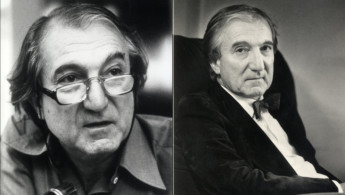'Father of Iraqi architecture' Rifat Chadirji dies from coronavirus aged 93
Rifat Chadirji was born in Baghdad in 1926 and went on to design some of the country's most iconic buildings and landmarks, including the Central Post Office and the now-destroyed Monument to the Unknown Soldier in the capital, as well as over 100 buildings across Iraq.
After studying in London, Chadirji was appointed director of the Building Department of the Iraqi Waqf that oversaw the construction of the country's mosques.
Chadirji's Monument to an Unknown Soldier was unveiled in Baghdad's Firdos Square in 1959. It's arched design was inspired by the shape of a grieving mother attempting to embrace her martyred son. The monument was later demolished in 1982 and replaced with a statue of Saddam Hussein, which was in turn destroyed by US forces invading the city in 2003.
In 1961, Chadirji and Iraqi sculptor Jewad Selim were commissioned by Prime Minister Abdel-Karim Qasim to build Baghdad's Freedom Monument in central Tahrir Square to celebrate the country's independence from colonial rule.
The 50-metre-long monument depicting the events leading up to the 1958 revolution in Babylonian, Assyrian and Arab styles, is now among the city's most loved icons.
Twitter Post
|
His other well-known buildings include the Abood building, the Hamood Villa and the Offices and Tobacco Warehouses, all designed in his signature modernist style.
Mosul's National Insurance Company building, designed by Chadirji in 1966, hit the headlines in recent years after it was reported the Islamic State group used the building to murder young men accused of homosexuality.
The seven-story structure, which had been a symbol of modenity in the southern Iraqi city, was mostly destroyed in the battle to liberate Mosul from IS in 2017, and officially demolished in 2019.
However Chadirji fell foul of the regime in the late 1970s after opposing the Baathist movement, and was imprisoned for 20 months in Abu Ghraib prison. However he was able to pen three books while behind bars after his wife, the writer Balkis Sharara, smuggled out his manuscripts.
Chadirji was released in order to work on an international conference centre in Baghdad in which Saddam Hussein wished to host the 1982 Non-Aligned Movement summit.
A year later he left Iraq for a post at Harvard University, returning to his homeland only once more after the 2003 invasion.
Chadirji was awarded the prestigious Aga Khan Chairman's Award for Architecture in 1986, one of only four people ever to have won the prize.
Tributes poured in for the designer, who was described in a recent profile as the "father of Iraqi architecture".
Emirati commentator and gallery founder Sultan al-Qassemi said that Chadirji’s passing was the loss of "one of the greatest living architects".
Read also: In-depth: 'We are here': The LGBT activists on the frontline of Iraq's revolution
Iraq’s Prime Minister-designate Mustafa Kadhimi described Chadirji as a "friend" whose passing was "a loss for Iraq and humanity".
"He was a model for devotion to national architectural identity, and his legacy reflects how architecture can define cities and nations. May he rest in peace. Our thoughts are with his family," Kadhimi tweeted.
Iraqi president Barham Salih also paid tribute to Chadirji, saying he "breathed modernity and beauty" into the country.
Follow us on Facebook, Twitter and Instagram to stay connected




 Follow the Middle East's top stories in English at The New Arab on Google News
Follow the Middle East's top stories in English at The New Arab on Google News


